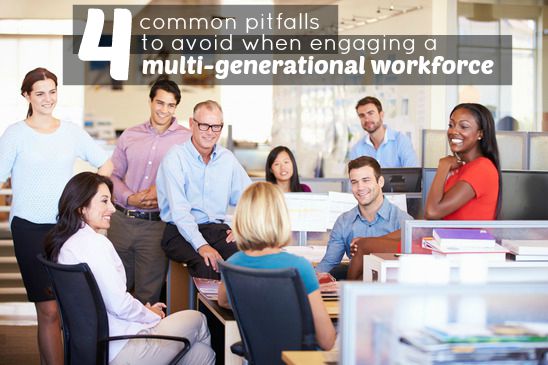The rise of technology and Internet access have forced massive change in the workplace. But perhaps it’s the Millennial worker that has caused the most tension in the workplace. The generational divide at work has never been deeper and more daunting than it is today. Here are today’s most relevant challenges with engaging a multi-generational workforce and how best to resolve the challenges.
1) Varying Viewpoints
Most notably, each generation has a very different perspective when it comes to work. Baby Boomers define themselves by the work they do, often using tangibles such as titles, salary, and cars as indicators of success. Millennials take a much more fulfilling approach to work, often looking for more work-life integration and leaning into technology to work smarter.
Baby Boomers evaluate hard work by how much time is invested in the work (i.e. tenure). Millennials define hard work by how much of their heart they put in the work (i.e. passion). Baby Boomers take pride in the loyalty towards their employer. Millennials take pride in their personal brand, the skills they gain, and the free-agent approach to their career. Generation X typically shares the views of Baby Boomers or Millennials or has a variation of these views.
These varying viewpoints of work can cause heavy friction between employees and force a leader to exhasutively cater to both expectations.
Related Read: Narrow The Generational Gap By Understanding Each Generations Unique Perspective Of Work
2) Asserting Assumptions
With each new generation comes a slew of stereotypes and labels. Most of the time these stereotypes are used as a shortcut to better understand the generation instead of actually getting to know the individual.
It’s easy to assume how Millennials want to be led, how Generation X prefers to collaborate, or how Baby Boomers want to communicate. It’s difficult to actually ask and adapt to the actual way generations want to be led, collaborate, and communicate in the workplace.
Related Read: Why Your Assumptions Are Undermining Your Leadership Ability And What To Do About It
3) Clashing Communications
Some people prefer a phone call, some an email, and others a text. This is the current reality of our workplace communications. There are more channels than ever before to communicate and each generation has a varying communication preference.
Millennials often view face-to-face communication as archaic when a flick of the thumbs on a smartphone can communicate something to the world. Some Baby Boomers view digital communications as impersonal and lazy. The truth is that online and offline communications matter and every generation has to be comfortable and competent with both.
Related Read: The 5 New Rules Of Face-To-Face Communication Ever Millennial Needs To Embrace
4) Putting-off Potential
In today’s fast times, it’s easy for us to look for quick wins and neglect to look long term. We value the immediate and ignore the potential.
It’s important to think of your multi-generational workforce as a Swiss Army Knife of intelligence, experience, and potential. Each generation carries a unique set of experiences and contributions that can be tapped for new ideas. A generationally diverse workforce can be your greatest catalyst in our ever-changing world.
Related Read: Why Millennial Leaders Might Be Your Company's Secret Weapon To Success
A Solution To Engage A Multi-Generational Workforce
The best solution to address each of these pitfalls is reverse mentoring. Reverse mentoring will turn varying viewpoints into awareness and appreciation, asserting assumptions into open communication, clashing communications into clear and focused communications, and putting-off potential into knowledge transferring.
Click here to learn what is reverse mentoring, who is using it, and how you can begin implementing it to engage your multi-generational workforce.
Question: What challenges have you faced when engaging a multi-generational workforce?
Consider Ryan Jenkins to be your next Millennial/Generation Y or Generation Z keynote speaker by clicking here...
![]()






